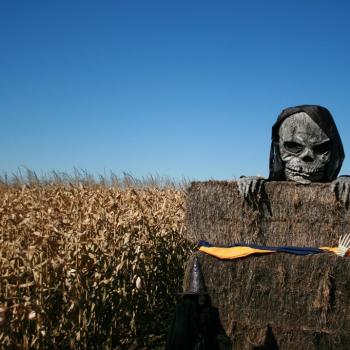On "The Historical Jesus"
God and Empire: Jesus Against Rome, Then and Now by John Dominic Crossan (2008).
In this fine study of civilization, culture and transformation, Father Crossan asks important questions: have those who resort to violence as a means of change succeeded in their quest for empire? Or has nonviolence been more effective in bringing about lasting change? Crossan, professor emeritus at De Paul University and author of several well-received works including The Historical Jesus, believes that the solution is not in violent intervention but in the coming of the Kingdom of God on earth. But how, and when, will this Kingdom come? In comparing the missions of Jesus and John the Baptist, Crossan states his idea clearly: "Jesus differed precisely from John in emphasizing not the future-presence but the already-presence of God's Kingdom as the Great Divine Cleanup of the world." In other words, Christ saw the Kingdom as a present and active reality. Crossan uses the teachings of Jesus to promote his thesis, and then turns to an unlikely ally -- the Apostle Paul -- by suggesting that Paul's emphasis on equality and freedom helped carry forward Jesus' program of nonviolent change. Crossan's latest work presents a complex subject in a clear and powerful way, and it merits a wide readership.
Q, the Earliest Gospel: An Introduction to the Original Stories and Sayings of Jesus by John S. Kloppenborg
An introduction to the study of Q, the collection of Jesus' sayings long hypothesized as the source for the canonical gospels of Matthew and Luke.
"Bonus Points": Reading the Old School Sources
William James, William James: Writings 1902-1910: The Varieties of Religious Experience / Pragmatism / A Pluralistic Universe / The Meaning of Truth / Some Problems of Philosophy / Essays.
William James (January 11, 1842 - August 26, 1910) was a pioneering American psychologist and philosopher trained as a medical doctor. He wrote influential books on the young science of psychology, educational psychology, psychology of religious experience and mysticism, and the philosophy of pragmatism. He was the brother of novelist Henry James and of diarist Alice James. William James was born in New York City, the son of Henry James Sr., an independently wealthy and notoriously eccentric Swedenborgian theologian well acquainted with the literary and intellectual elites of his day. James interacted with a wide array of writers and scholars throughout his life, including his godfather Ralph Waldo Emerson.
William James's Gifford Lectures of 1901-1902 have been heralded by some as the greatest lectures ever to be presented in the series and perhaps the most seminal of his works (alongside The Principles of Psychology). Published initially in 1902, The Varieties of Religions Experience: A Study in Human Nature has stood the test of time and been republished thirty-six times, while the board of the Modern Library declared it to be the second best nonfiction book of the twentieth century. The lectures address religious experience not at the corporate level, but focus on personal religious experience. It has been suggested that one cannot read the lectures without being struck by the resonance of James's own individual struggles with severe depression. The published version of the lecture series continues to be regarded as a fundamental text in the study of religious experience.
Walter Rauschenbusch, Christianity and the Social Crisis in the 21st Century: The Classic That Woke Up the Church
Walter Rauschenbusch (1861-1918) was the leading proponent of the Social Gospel Movement whose mission was to reform society to meet the social needs of the poor through the ministrations of the institutional church. And, in the wake of the success of Jim Wallis' God's Politics, comes an anniversary edition of Walter Rauschenbusch's Christianity and the Social Crisis, a book which outsold every other religious volume for three years and which has become a classic and mainstay for any Christian seriously interested in social justice. PBS has named Rauschenbusch one of the most influential American religious leaders in the last 100 years, and Christianity Today named this book one of the top books of the century that have shaped contemporary religious thought. So it seems fitting on the 100th anniversary of the publication of Christianity and the Social Crisis that Rauschenbush's great-grandson should bring this classic back into print, adding a response to each chapter by a well-known contemporary author such as Jim Wallis, Tony Camplo, Cornel West, Richard Rorty, Stanley Hauerwas, and others. Between 1886 and 1897, he was pastor of the Second German Baptist Church in the "Hell's Kitchen" area of New York City, an area of extreme poverty. As he witnessed massive economic insecurity, he began to believe that Christianity must address the physical as well as the spiritual needs of humankind. Rauschenbusch saw it as his duty as a minister and student of Christ to act with love by trying to improve social conditions.




